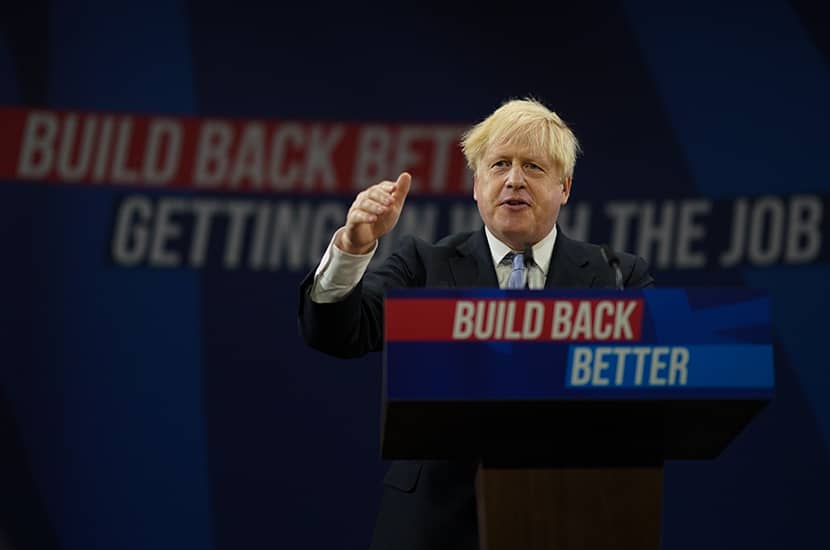Most prime ministers would be worried about supply chain shortages. But as became increasingly clear at the Tory party conference in Manchester, Boris Johnson has instead spotted a political opportunity. He denies there is a crisis and claims that the recent ‘stresses and strains’ amount to nothing more than the economy reawakening after lockdown. As for the worker shortages, he believes they are proof of a ‘robust economy’ which will result in people being paid more.
This has been the Tories’ theme in Manchester: set up a dividing line between a government that wants workers to be paid more and those who want to ‘reach for the same old lever of uncontrolled immigration to keep wages low’. The Tories are desperate to accuse Labour of drifting back towards free movement. They will seize on every example of Keir Starmer calling for a relaxation of immigration rules.
It is not difficult to see why Johnson is attracted to this approach. During the referendum campaign, he argued that controlling migration would lead to higher wages — a claim that various economists dismissed as nonsense. If he can now say he was right, and that Brexit and the end of free movement has boosted wages for British workers, he will have a clear appeal to voters who backed him during the 2016 referendum and the 2019 general election.

This approach, however, is not without risk. In Manchester, it was clear that even members of Johnson’s inner circle are concerned. One minister, who agrees that Britain’s economy should move away from relying on foreign workers, thinks it is a mistake to squeeze this transition (and the accompanying pain) into the months before Christmas. He frets that ‘the greatest danger to Brexit’ comes from transitioning too quickly, leading to people placing the blame for empty shelves on our exit from the EU.
Many ministers privately think that the government should be doing more to manage this transition. One secretary of state suggests that a slew of jobs could be added to the ‘shortage’ list (for migrants) but with a relatively high salary requirement. This would enable businesses to recruit the workers needed while ensuring that wages rise for professions with gaps (such as road haulage and hospitality). This would not be ‘uncontrolled immigration’ or anything like it. Instead, it would be a system of managed migration designed to plug holes in our labour market.
The danger is that pay rises struggle to keep up with inflation, leaving workers worse off in real terms
The Tories who believe that worker shortages will lead to higher wages feel emboldened that the party has been unaffected in the polls by the petrol-pump -crisis (unlike the 2000 crisis when Tony Blair lost his poll lead for the first time). Nevertheless, it would be a brave government that assumes the public’s patience is infinite. If these problems flare up again, or get in the way of Christmas, then voters might cease to be so tolerant. That is why others in government fear the PM is taking a big political risk in claiming that the worker shortages show everything is going to plan.
Given the ongoing shortage of lorry drivers, which shows no sign of abating, it is hard to see how more supply-chain problems will be avoided in the coming weeks. The government might have offered more visas for truckers. But a UK visa lasting a few months when lorry drivers are in high demand across the Continent is not a particularly attractive proposition. Strikingly, the take-up of these visas has been poor — most of them are currently unfilled.
The Leave campaign promised a strategic, points-based immigration system. Now is the time to use it. If ballet companies are allowed to bring in dancers as long as they are earning £23,840 a year, then why shouldn’t companies that are vital to supply chains be able to do the same if they pay their foreign workers properly? At present, occupations are only added to the shortage list after an assessment from the Migration Advisory Committee. But this isn’t a legal requirement. The government can change the ‘shortage’ list whenever and however it likes. There is already a clear case for doing so in various sectors.
Another idea has been suggested by Simon Wolfson, the Leave-supporting Next boss. He has proposed that firms pay a National Insurance premium for foreign workers. This, he argues, would mean that people were not hiring foreign workers because they were cheaper. Johnson has publicly dismissed this suggestion. But there are those in government who can see the appeal of it, even if they worry about the legality.
The other risk that Johnson is running is inflation. He is dismissive of the idea that inflation could take off, telling Sky News: ‘People have been worrying about inflation for a very long time, I’m looking at robust economic growth — and by the way, those fears have been unfounded.’ This statement offers a hostage to fortune, however, given what is happening with energy prices. UK natural gas is, at the time of writing, trading at 350p a therm for the first time. Its price has increased sevenfold over the past 12 months. Even the Bank of England, which has consistently underestimated how high inflation would go, now expects it to hit twice the target level — 4 per cent — and stay there for months.
If the Bank of England gets worried about inflation rising even higher and feels it has to hike interest rates in response, that would hit the post-Covid recovery hard — as Andrew Bailey, the Bank governor, warned in a recent speech. If wages rise but without any increase in productivity, that would push up inflation still further. The danger is that pay rises will struggle to keep up with inflation, leaving workers worse off in real terms than they were before.
The PM claims that the government tackles the ‘problems that no government has had the guts to tackle before’. Over the next few months, though, the government might well have to concentrate on some very basic issues. The public won’t believe the boasts about ‘levelling up’ or ‘building back better’ if they are struggling to do their weekly shop or put petrol in their cars. It will take more than words and optimism to transform the UK’s economic model. The whole process needs to be handled with care. The government likes to talk about delivery, but this is the greatest — and most complex — delivery challenge of all.







Comments